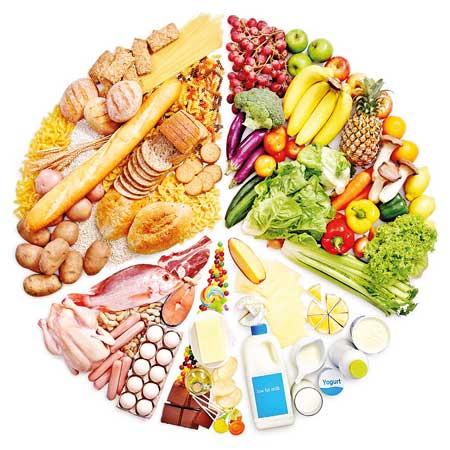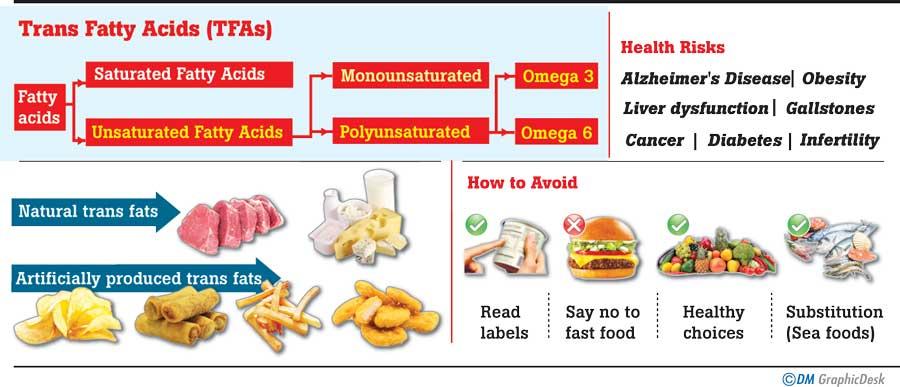08 Mar 2019 - {{hitsCtrl.values.hits}}

 For the longest time, ‘Fats’ have been misconceived and given a bad reputation in terms of diet. While this may be true of some types of fats, all fats are not created equal. Some fats are better than others; some promote good health. How do we differentiate between the healthy and the unhealthy fat though? Are Cholesterol and obesity the only red flags in consuming unhealthy fats? More specifically, what are Trans-fats and why
For the longest time, ‘Fats’ have been misconceived and given a bad reputation in terms of diet. While this may be true of some types of fats, all fats are not created equal. Some fats are better than others; some promote good health. How do we differentiate between the healthy and the unhealthy fat though? Are Cholesterol and obesity the only red flags in consuming unhealthy fats? More specifically, what are Trans-fats and why
are they harmful?
Taking up the role of answering these questions and clearly explaining the difference between good and bad fats, how much fat we are recommended to consume, how to avoid trans-fats and the role of fats in our health, Dr. Sriyani Ranasinghe, Consultant Community Physician at the Health Promotion Bureau spoke to the Health Capsule.
Dietary Fats Classified
Dietary fats are an essential part of a balanced diet especially as a major source of energy. It is important to first learn the various forms of fats that are widely available in our food supply.
“A major component of dietary fats is fatty acids. There are Saturated fats acids and Unsaturated fatty acids. Unsaturated fatty acids are of two types: Monounsaturated and Polyunsaturated. Polyunsaturated fatty acids contain Omega 3 and Omega 6 fatty acids.” Dr. Ranasinghe explained.
While Trans fats are another type of fatty acids, Cholesterol, she added is but another form of dietary fat.
Trans Fatty Acids (TFAs)
The mechanism behind this health hazard according to Dr. Ranasinghe is the hydrogenation of fatty acids, which happens under high temperatures.There are both natural and artificial Trans fats.
“Natural trans fats are found in meat and dairy products, which is a small amount. Production of trans fats due to refrying and deep frying is the problem,” she explained.
These artificially produced trans fats are found in your favourite bites, your midnight snacks and your guilty pleasures.
Biscuits, potato crisps, fast food items such as French fries, battered fish and nuggets, short eats like pastries and pies, and so many other tempting but damaging choices contain this threat.
Healthy choices should also be made in the kitchen. Knowing which oils to use for which purpose is key. Money and convenience over health will only cause you to suffer in the long run
How do they affect us?
While all fats when consumed in excess paves the way for obesity and heart disease, Trans fats alone give rise to a plethora of complications.“Consuming the food that contain trans fats increases the risk of non-communicable diseases, heart diseases, cancers and strokes,” Dr. Ranasinghe expressed.
The WHO mentions that TFAs, especially industrially produced partially hydrogenated vegetable oils are associated with infertility, endometriosis, gallstones, Alzheimer’s disease, diabetes and some cancers.Deciding the right type of dietary fat to consume is therefore crucial.
How to avoid
Dietary choices are a major aspect of one’s lifestyle, and immersed in fast paced, convenient routines, changing these consumption patterns are a struggle.
Listed below is an array of tips and tools presented by Dr. Ranasinghe to help us move in the right direction; to make a change even in the slightest way possible.

The WHO recommends that TFAs should be less than 1% of our daily energy intake” Dr. Ranasinghe mentioned. Natural trans fats are only a trifling amount, keeping away from refried and/or deep fried products will enable us to stay within this 1% limit, she expressed.
Healthy choices should also be made in the kitchen. Knowing which oils to use for which purpose is key. Money and convenience over health will only cause you to suffer in the long run.
“For deep frying coconut oil is the best. For tempering and other purposes Olive oil is recommended. Vegetable oils should not be used for deep frying,” Dr. Ranasinghe shared.
Bottom-line
Trans fats may tick off the factors of Taste and Time in one’s diet, but at a grave cost. While the transition from ease to health may be difficult, it is an essential one.
The WHO stated that eliminating trans fats is key to protecting health and saving lives as over five hundred thousand deaths have been caused by trans fat intake leading to cardiovascular disease.
While such organizations work with governments and food industries on a global scale to create healthier food systems for future generations, you and I can kick-start this strategy within our own families.

22 Dec 2024 23 minute ago
22 Dec 2024 2 hours ago
22 Dec 2024 2 hours ago
22 Dec 2024 5 hours ago
22 Dec 2024 5 hours ago